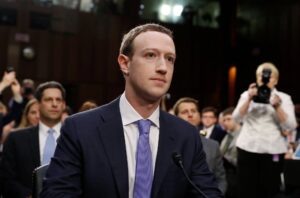by The Cowl Editor on April 12, 2018
National and Global News
by Ernie Andreoli ’18
News Staff

Roughly 87 million American Facebook users had their data gathered by Cambridge Analytica and a British-based data firm as a part of a political consulting work, which included President Donald Trump’s campaign operation. In light of the revelations first published by The New York Times and The Observer last month, several U.S. state attorney generals have begun investigations into Cambridge Analytica’s misuse of tens of millions of Facebook users’ personal data.
In addition, Facebook has suspended Cambridge Analytica from its site for violating its terms of service and Cambridge Analytica’s Board of Directors has suspended CEO Alexander Nix from the company. Multiple undercover reports stated that Nix instructed his inferiors to bribe politicians for partnership purposes, and the benefit of the company’s development of a database that captured psychological profiles of American voters.
According to several confidential reports, the political consulting firm attracted conservative campaign teams with avant-garde data collection tools that allowed them to compete with Democratic opponents in the 2016 presidential campaign. In an interview with The New York Times last month, Christopher Wylie, a whistleblower who helped found the political consulting firm and worked there until 2014, stated: “Rules do not matter for them. For them, this is a war and it is all fair.” In a February 2016 interview with NPR, Nix disclosed that the company worked with information technology researchers to develop a “120-question survey” with the intent to “probe personality” by presenting this survey to thousands of Americans. Nix acknowledged that the company asked a series of behavioral questions in order to create personality models for prospective voters.
Records investigated by the Times revealed that around 300,000 people took this survey. While the story continues to unfold day by day, what is known is the fact that Aleksandr Kogan, a researcher affiliated with Cambridge University, created an app that allowed access to users’ Facebook accounts. The data, which was intended for academic purposes, included details about users’ friends, education, location, occupation, relationship status, and pages liked.
On April 4, Facebook disclosed that Kogan’s data transaction to Cambridge Analytica included as many as 87 million users. However, at the time of the reported leak last month, Facebook projected that only roughly 50 million users could have been affected. While Nix and other spokespeople for the company denied receiving or using the Facebook data during a Parliament hearing in February, the Times obtained a statement from the company in March stating that the company did receive Kogan’s data, but deleted the compilation after realizing that the undertaking could lead to infringements on privacy laws, and the illegality of hiring foreign consultants in political campaigns.
In Dec. 2017, Special Counsel Robert Mueller requested that Cambridge Analytica turn over employees’ emails and other undisclosed documents as a part of an effort to investigate the Trump campaign’s data operation. While the special counsel’s strategy remains largely concealed to the public, anonymous sources revealed to the Times last month that Cambridge Analytica had previously held business ties with Russian and Ukrainian affiliates. In regards to how Facebook fares in this situation, the company acknowledged that it first knew about the data mishap in Dec. 2015, and only started notifying users whose data was compromised on April 9. On Tuesday, Mark Zuckerberg, Facebook’s founder, testified before a joint session of the Senate commerce and judiciary committees.
While Zuckerberg admitted personal responsibility for the company’s handling of user data and pledged to resolve the situation from ever occurring again, the hearing brought to light the issues facing social media platforms: the transparency of users’ consent with private social media platforms, and privacy.
“We are in an age where storing and processing data has never been cheaper,” noted Dr. Adam Villa, an associate professor of computer science at Providence College. Prior to this leak, Villa believed that information technology and social media companies could store data with a lack of concern for users’ information. Yet, it remains unknown at this moment what federal oversight could look like. While Zuckerberg hinted that the company could be open to a variation of the European Union’s Data Protection Directive, a statute that regulates the harvesting of personal data, Villa maintained that the majority of data processing covertly occurs behind the scenes. “Internet users must have the mentality that anything could be tracked, traced or used for some uncharted purpose.”
Dr. Matthew Guardino, an assistant professor of political science at Providence College, believes that Zuckerberg’s testimony will lead to more dialogue about the business models of social media networks on the internet, but that this conversation has been “far overdue” at the congressional level. Guardino insisted that Democrats and Republicans have been adverse to media regulation for various political purposes, but he noted that “public opinion on this issue will affect future regulatory outcomes.”
In regards to what type of restrictions would be constitutional to enact on social media companies, Guardino stated that because there have been different first amendment interpretations floating around in the courts, a straightforward regulatory plan of action is not set in stone. In addition to determining how to better protect users’ data, the hearing held powerful political implications. Guardino raised an important inquiry that remains dubious: “How comfortable are we with data being used to manipulate us and to hold certain opinions?” This question remains at the forefront of policymakers’ agendas in Britain and the United States.